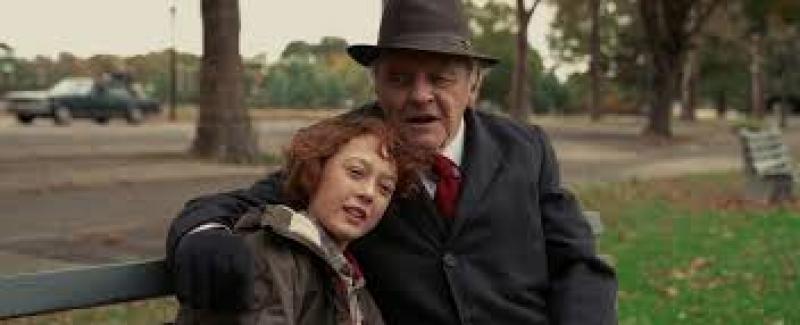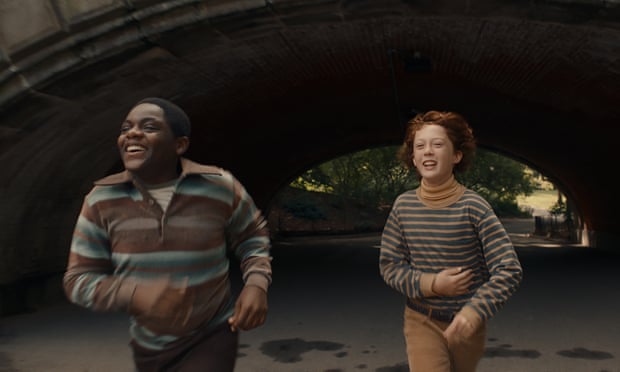Armageddon Time review - James Gray goes back to skool | reviews, news & interviews
Armageddon Time review - James Gray goes back to skool
Armageddon Time review - James Gray goes back to skool
The director's wistful memoir of his New York City boyhood

Was it lockdown that did it? Forcing filmmakers to sit at home, contemplate their lives, and conclude that just as soon as the masks came off, it was time to shine a light on their youth?
Since Covid struck, we’ve seen Kenneth Branagh’s growing-up-in-the-Troubles memoir Belfast, Richard Linklater’s nostalgic animation Apollo 10 1/2 : A Space Age Childhood, and The Souvenir Part II, in which Joanna Hogg mines her film student days yet again.
There's also Charlotte Wells’s superb debut Aftersun that looks back from a grown daughter's perspective on a Turkish package holiday she took with her father in the late Nineties, complete with camcorder. When The Fabelmans, Steven Spielberg’s tale of a movie-crazy schoolboy, opens in the UK next year, it’ll doubtless have his biographers ticking off the overlaps.
The 12-year-old hero of James Gray’s Armageddon Time isn’t obsessed with making movies, but he does want to be an artist, despite his family insisting he enter a profession. And just like Spielberg’s stand-in Sammy Fabelman, Gray’s Paul Graff (Michael Banks Repeta) has to deal not only with family conflicts, but also the legacy of Jewish persecution that brought his grandparents to America.
Early in the film, there’s a beautifully choreographed Altman-esque dinner scene – with everyone talking at once – that gives vital clues about the family dynamics, Beloved grandpa Rabinowitz (Anthony Hopkins) ended up in the US because his mother fled Ukraine after witnessing her parents being murdered. Paul's sad-sack dad Irving (Jeremy Strong) monologues about the engineering of bridges. Older brother Ted (Ryan Sell) can’t resist tormenting Paul.
Trying to feed the family – and not just at mealtimes – is Esther (Anne Hathaway), Paul’s long-suffering mother. She's trying to hold down her job teaching home economics while nursing ambitions in local educational bureaucracy that are about to be thwarted by Paul’s bad behaviour at school.
Gray uses TV news to convey 1980s America as a country sunk in the worst recession since the Great Depression; the Reagan presidency looms. The family argue about keeping Paul in the public school system with its badly funded, overcrowded class rooms. He’s happy where he is, having made friends with Johnny (Jaylin Webb), a black boy in his class. Together they act as clowning irritants to their dispirited teacher.
When their misdemeanours escalate and land them in serious trouble, Gray shows that racism leads to Johnny being far more severely punished than Paul. The latter is moved to the stuffy private school his cleverer big brother already attends. To Irving's humiliation, Rabinowitz picks up the school fees.
 It’s a failing in an otherwise vivid script that Johnny fades from the film. The young actor Jaylin Webb (pictured above left, with Michael Banks Repeta) is a charismatic presence – Johnny's contemplative stare when confronted with injustice speaks volumes. Gray focuses on the guilt that Paul feels when he abandons his black friend more than he fleshes out Johnny’s life. There’s one brief scene in the rundown apartment where he lives with his bedbound grandmother. His future is left frustratingly vague.
It’s a failing in an otherwise vivid script that Johnny fades from the film. The young actor Jaylin Webb (pictured above left, with Michael Banks Repeta) is a charismatic presence – Johnny's contemplative stare when confronted with injustice speaks volumes. Gray focuses on the guilt that Paul feels when he abandons his black friend more than he fleshes out Johnny’s life. There’s one brief scene in the rundown apartment where he lives with his bedbound grandmother. His future is left frustratingly vague.
Gray is more interested in depicting chilling encounters Paul experiences at his new private school, the patrons of which are the Trump family. Its patriarch, German businessman Fred Trump (John Diehl), spots Paul in a corridor on his first day and interrogates him about his anglicised surname. Later the pupils listen raptly to an "inspirational" speech by the future president’s older sister, Maryanne Trump (Jessica Chastain). Though the director revels in putting these anecdotes about his encounters with the Trumps on the big screen, one suspects he's told them many times before.
There’s a lot to enjoy in Armageddon Time, from its subtle sound design and evocative score (the Sugar Hill Gang and the Clash feature) to cinematographer Darius Khondji’s ingenious rendering of the way New York looked in 1980. Some of the casting however is off, and there's a sense of too much nostalgic generosity being extended to Paul and not enough focus on the fate of Johnny for this to be a great film.
The future of Arts Journalism
You can stop theartsdesk.com closing!
We urgently need financing to survive. Our fundraising drive has thus far raised £49,000 but we need to reach £100,000 or we will be forced to close. Please contribute here: https://gofund.me/c3f6033d
And if you can forward this information to anyone who might assist, we’d be grateful.

Subscribe to theartsdesk.com
Thank you for continuing to read our work on theartsdesk.com. For unlimited access to every article in its entirety, including our archive of more than 15,000 pieces, we're asking for £5 per month or £40 per year. We feel it's a very good deal, and hope you do too.
To take a subscription now simply click here.
And if you're looking for that extra gift for a friend or family member, why not treat them to a theartsdesk.com gift subscription?
more Film
 Steve review - educator in crisis
Cillian Murphy excels as a troubled headmaster working with delinquent boys
Steve review - educator in crisis
Cillian Murphy excels as a troubled headmaster working with delinquent boys
 Can I get a Witness? review - time to die before you get old
Ann Marie Fleming directs Sandra Oh in dystopian fantasy that fails to ignite
Can I get a Witness? review - time to die before you get old
Ann Marie Fleming directs Sandra Oh in dystopian fantasy that fails to ignite
 Happyend review - the kids are never alright
In this futuristic blackboard jungle everything is a bit too manicured
Happyend review - the kids are never alright
In this futuristic blackboard jungle everything is a bit too manicured
 Robert Redford (1936-2025)
The star was more admired within the screen trade than by the critics
Robert Redford (1936-2025)
The star was more admired within the screen trade than by the critics
 Blu-ray: The Sons of Great Bear
DEFA's first 'Red Western': a revisionist take on colonial expansion
Blu-ray: The Sons of Great Bear
DEFA's first 'Red Western': a revisionist take on colonial expansion
 Spinal Tap II: The End Continues review - comedy rock band fails to revive past glories
Belated satirical sequel runs out of gas
Spinal Tap II: The End Continues review - comedy rock band fails to revive past glories
Belated satirical sequel runs out of gas
 Downton Abbey: The Grand Finale review - an attemptedly elegiac final chapter haunted by its past
Noel Coward is a welcome visitor to the insular world of the hit series
Downton Abbey: The Grand Finale review - an attemptedly elegiac final chapter haunted by its past
Noel Coward is a welcome visitor to the insular world of the hit series
 Islands review - sunshine noir serves an ace
Sam Riley is the holiday resort tennis pro in over his head
Islands review - sunshine noir serves an ace
Sam Riley is the holiday resort tennis pro in over his head
 theartsdesk Q&A: actor Sam Riley on playing a washed-up loner in the thriller 'Islands'
The actor discusses his love of self-destructive characters and the problem with fame
theartsdesk Q&A: actor Sam Riley on playing a washed-up loner in the thriller 'Islands'
The actor discusses his love of self-destructive characters and the problem with fame
 Honey Don’t! review - film noir in the bright sun
A Coen brother with a blood-simple gumshoe caper
Honey Don’t! review - film noir in the bright sun
A Coen brother with a blood-simple gumshoe caper
 The Courageous review - Ophélia Kolb excels as a single mother on the edge
Jasmin Gordon's directorial debut features strong performances but leaves too much unexplained
The Courageous review - Ophélia Kolb excels as a single mother on the edge
Jasmin Gordon's directorial debut features strong performances but leaves too much unexplained

Add comment